Peak Aspirations
January 31, 2017
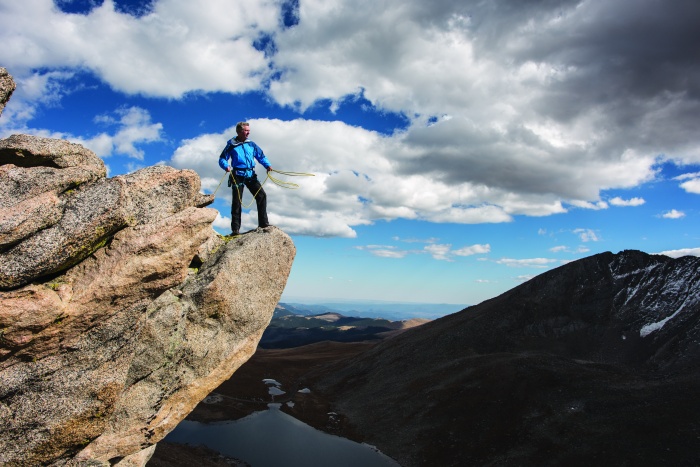
It’s still dark when Brad Clement '93 crawls out of his tent. The snow crunches beneath his feet as a cold wind chills his face. He fills a pot with snow and waits for it to melt on a small camp stove. Below him are the icy slopes he and his crew navigated the day before. Above, still wreathed in clouds, an imposing summit dares him to continue his climb.
It might be a common site for Clement, but that does not make it ordinary. As a professional mountain guide and high-altitude filmmaker who has seen the summits of Mount Everest, Mount Rainier, Mount Denali, Mount Kilimanjaro and more of the planet’s highest places, he continues to be driven not by the peak, but by the journey. However, Clement’s newest endeavor will not see him summiting any peak, but helping to preserve the world’s endangered snow leopards by working with communities in Nepal.
ROAD TO THE MOUNTAINS
Clement traces his love of the outdoors and passion for conservation to his childhood in the Midwest. Growing up in St. Louis, Clement and his family often spent time at his grandfather’s cattle ranch – a place he carries with him in all of his travels across the globe.
“Especially as a kid from Missouri, that farm seemed like the most wild, exotic place in the world,” Clement said. “It really captured my interest and my heart as far as a love for the outdoors and love for the wilderness.”
Clement enrolled as a history major and sociology minor at DePauw in 1989, choosing the institution because he wanted to attend a “quintessential small school in a beautiful pastoral setting.” At the time, he planned to use his degree and enter a traditional profession, eventually settling down and starting a family.
The summer after graduation changed everything.
Clement and a DePauw fraternity brother, Joseph M. Wilferth ’93, decided to use the summer to explore, before beginning their careers. The pair set off for Denali National Park in Alaska and spent the summer washing buses for the park service. The entire time, Clement found himself drawn to Mount Denali.
He wanted to climb it. Clement took a course on mountaineering at Mount Rainier, before challenging Mount Denali. The climb was an epiphany for Clement.
“It was terrifying, exciting and way over my head – and I loved it,” Clement said. “I wanted nothing more than to spend the rest of my life in the mountains.”
Over the next several years, Clement continued to grow his climbing skills. By the time he was 27, Clement had moved from St. Louis, where he was selling farms and ranches as a real estate broker, and relocated to Bellingham, Wash., to work as a mountain guide.
THE REAL REWARD OF A CLIMB
The summit might be the destination, but adding trophy climbs to his climbing résumé has never been the goal for Clement. Rather, the ascent and descent are just as significant as standing on the peak. He relishes in not only the physical challenge of the journey, but also the mental aspect – seeing a trip up a mountain and a safe return below as a puzzle to be solved.
“For me, climbing and the mountains have always been about absorbing all that there is in that environment,” Clement said. “Sometimes that is enjoying the pure physicality of climbing on ice versus rock, or winding through massive crevasses and snowfields to solve the puzzle of the route. It’s always an engaging journey.” As a seasoned mountaineer, Clement has charted routes countless times on personal expeditions and led others as a guide. He is one of a handful of people in the world who has summited Mount Everest from the north and south. Despite his success and that he has stayed safe from harm, Clement has been careful not to let ego or pride cloud his judgment, especially when a mistake could spell disaster.
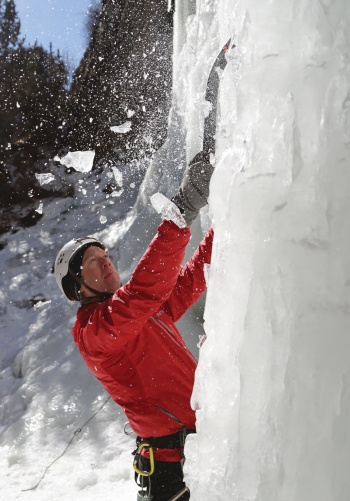
“You always need to respect the climb and be cognizant of the risks,” Clement said. “My wife, Tonya, and I have had many friends die over the years. Sometimes we’ve been with them, and sometimes we hear about it through the community. The risks are real.”
Often the most thorough planning, research and preparation are still not enough to make the journey as planned. Clement recalled an expedition up Annapurna I. The mountain, at 26,545 feet, is the 10th highest in the world, and it carries the highest fatality rate at 41 percent. Only three Americans have reached the top – Clement is not one of them.
“We got nowhere near the top,” Clement said. “It is one of the scariest places I’ve been. The mountain conditions were not in our favor, and we had to acknowledge it was not our time.”
Despite having to call off the expedition, Clement does not consider the Annapurna I expedition, or any climbs where he and his group were forced to turn back, a failure. Rather, they have become some of his most significant moments.
“When I am climbing with friends, I have no agenda other than to enjoy the climb,” Clement said. “The mountains I summit right away are often less meaningful. When there is more of a struggle and I don’t reach the top, that is more meaningful and a stronger memory.”
FROM MOUNTAINEER TO FILMMAKER
The mountains called to Clement, and he had answered. But after years of living around the lofty peaks and daunting climbs, he faced a new challenge – how to make a life out of it. Leading expeditions was enjoyable work for Clement, but not necessarily a steady income. Ultimately, the solution came once again from his Midwest roots.
Clement’s mother was a photographer and even kept a dark room in their home. As a result, Clement grew up enjoying photography and realized that he might be able to make a living with his mother’s craft.
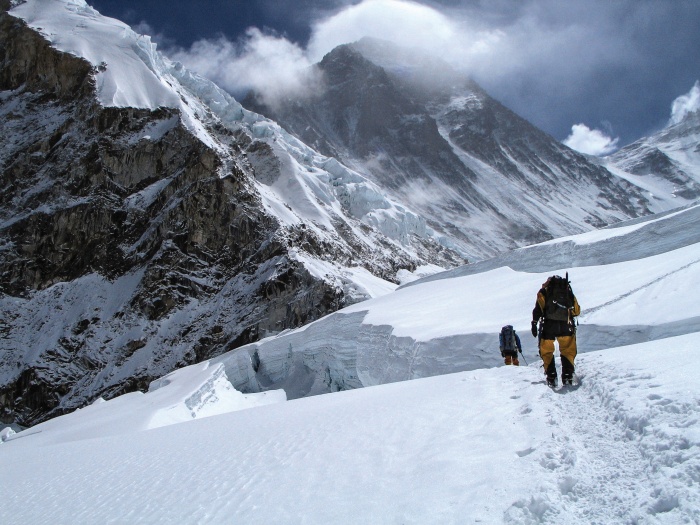
“I didn’t originally get into filming to film,” Clement said. “I needed something that could keep me in the mountains and provide a career path. I decided to just start calling myself a cameraman and film anything and everything in the mountains.”
In the years since he first began filming, Clement’s motivations have completely changed. His experience in navigating routes, understanding the flow of a climb and how to interact with groups gave him the expertise to succeed in filmmaking. Along the way, Clement fell in love with the technical aspects of storytelling and showing the personal journeys of individuals as they attempted to conquer some of the most beautiful and remote places in the world.
Under the label Spindrift Films, Clement has filmed around the world for Google, Outdoor Channel, Discovery Channel, PBS and several corporate entities, to name just a few, who have enlisted his talents to tell stories and grow brands.
Many of his projects have had widereaching influence. Clement was the cinematographer for the Everest Peace Project, a world-peace climb that saw people from different cultures, religions and backgrounds working together to reach the top of Mount Everest. The culmination of the project was the firstever joint ascent by Israeli and Palestinian climbers. The resulting documentary, Everest: A Climb for Peace, was narrated by actor Orlando Bloom and received widespread acclaim, including praise from the Dalai Lama.
This project was especially significant for Clement because during it he met his wife, Tonya Riggs, also an accomplished climber and a Boulder, Colo. resident who works for a technology firm. Riggs was one of just nine other climbers on the Everest Peace Project.
“We instantly clicked,” Clement recalled. “Since that trip, we’ve never been apart. After that expedition, I moved to Boulder where she lived.”
Clement’s wife has been an invaluable partner to him personally and professionally, sharing and supporting many of his high-altitude interests, including his newest endeavor – education through conservation.
A FATEFUL MEETING
Clement, who serves as founder and board president of the Pangje Foundation, first became interested in snow leopard conservation after reading a National Geographic article about Som Ale, regional director of a global conservation organization, who was using the cats to teach conservation to Nepalese children.
Clement was impressed that Ale was preserving an endangered species while also helping participants build stronger bonds with their communities, develop valuable research skills and connect with their culture.
He decided to write Ale to see if he could film Ale and the kids in action, with the possibility of using clips to approach networks and initiate a larger project. At first, Ale was not interested. However, months later, Clement received a message from Ale with dates for his next camp, asking if he wanted to film.
“We had never even spoken over the phone, and the dates were just weeks away,” Clement said. “But I knew that if I said no then, I would never have gotten the offer again.”
The two planned to meet in Jomsom, a remote town in Nepal. The journey did not go well for Clement. Monsoon season was underway when he landed in Kathmandu. There were no flights available to Jomsom, and time was running out to meet Ale. Clement hired a private vehicle that took him through washed-out roads to where he could connect with a bus to Jomsom. With 20 miles to go, the bus broke down. Clement hired a porter and finished the journey on foot. By the time he arrived in Jomsom, he was already a day late.
When he finally got in touch with Ale, he discovered that the scientist had been delayed several days, facing similar challenges from the weather.
When Ale finally arrived a few days later, Clement found an instant rapport with him, calling the researcher and humanitarian “one of the brightest and most inspirational people he has ever met.”
The rain never stopped during the camp. For several days, Clement filmed Ale and Nepalese children setting up trail cameras, counting prey species and collecting vegetation samples. The children’s cotton clothes and ragged tents did little to keep them from the elements, but the whole time Clement watched as they laughed, had fun, and most importantly, learned.
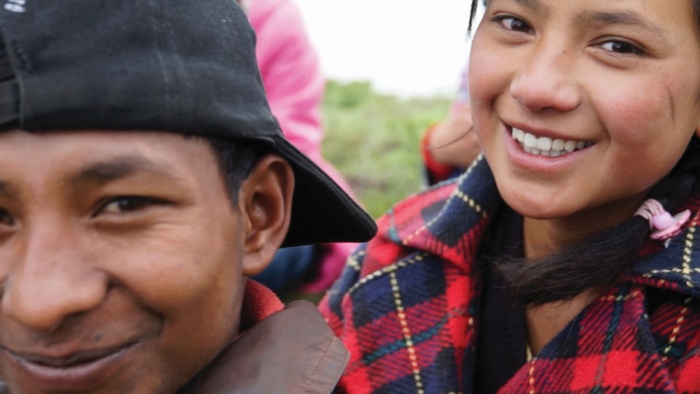
“To see the simplicity of Ale’s program and what it could do blew me away,” Clement said. “These kids were poor, under educated and didn’t have prospects for a future outside their village. But they were finding inspiration in the middle of the mountains through snow leopards.”
As soon as the camp concluded, Clement called his wife and told her that this was what he wanted to do the rest of his life.
THE SNOW LEOPARD AS KEY
Snow leopards are an integral part of Nepal’s ecosystem and culture. According to the World Wildlife Foundation, there are between 4,510 and 7,350 living snow leopards, making it an endangered species. An estimated 350–500 snow leopards, or approximately 10 percent of the world’s snow leopard population, live in Nepal.
Despite being an apex predator, the animals are constantly threatened by loss of habitat, climate change, poaching and retaliatory killings by livestock farmers. However, Ale and Clement hope that the Pangje Foundation and its programs will create a culture of stewardship in the next generation of Nepalese children, helping to preserve snow leopards, while also offering opportunities for education.
“Through the vehicle of snow leopards, you are actually helping the people,” Clement said. “You are helping the environment, but you’re also helping the people gain purpose, education, inspiration and a sense of global citizenship.”
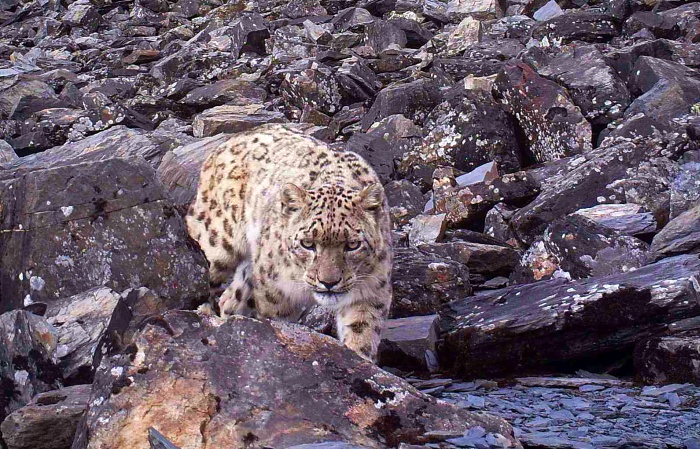
So far, the cornerstone of the Pangje Foundation is the STEWARDS program, which continues Ale’s hands-on work with snow leopards and local children. The program is open to students 12-14 years old and incorporates a year of conservation studies. It culminates in a six-day camp during which the students identify snow leopards through camera traps, analyze prey species density, collect DNA samples and study area vegetation.
By the end of the year, program participants not only have a better understanding of the importance of the snow leopard and how they can help preserve its numbers, but also how wildlife diversity and the surrounding environment are something they can take personal, community and national pride in.
“The community is very enthusiastic about the program,” Clement said. “Kids come back and get their siblings excited about it. Parents and grandparents are excited their kids have this opportunity and in turn are excited to share their own knowledge of snow leopards. Everyone realizes that they are preserving a part of their future.”
While Clement originally founded the Pangje Foundation as a way to be able to collect donations to support the program, he, too, is seeing ways to enhance and expand the work. He would like to make livestream video and film a component of the experience. His hope is that by letting students in Nepal, the United States and other nations interact with one another, children throughout the world will build a sense of global citizenship and shared responsibility for the world’s ecosystem and resources. Clement also sees the value in using a key animal to teach stewardship, along with skills in research, science and conservation to other communities.
“It would be wonderful if our model for animal conservation creates a standard for ecological stewardship,” Clement said. “Conservation is important everywhere. It can have a global impact, and that is really important.”
THE DEPAUW CONNECTION
Clement discovered the confidence to create his path as a mountaineer and filmmaker through the relationships he formed while at DePauw. He encourages current students to “take everything you’ve learned from DePauw in the traditional sense, think outside the box and apply it to something you’re passionate about.”
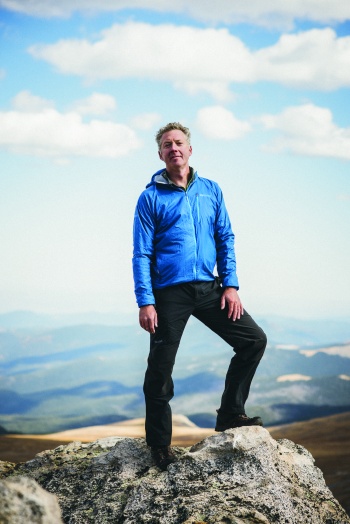
Clement also found support for Pangje through relationships forged at DePauw. Dr. Joseph M. Wilferth ’93, along with fraternity brothers Ryan M. Jamboretz ’96, Brian M. Topper ’96 and Peter C. Weber ’93, serve on the advisory council for Pangje. Molly Terrill Spowal ’96 is a member of the board of directors. Clement continues to rely on the expertise of these DePauw alumni as he works to build Pangje into a thriving organization.
“DePauw created a unique environment where I met some of the best friends I would make,” Clement said. “They have also been successful in their own journeys through life. Their experience, perspectives, and ideas all are valuable in creating and growing this unique organization.”
Moving forward, Clement is approaching his work with Nepal communities and snow leopards in the same way he would a climb, with careful preparation, an eye on what awaits and an appreciation for every step of the journey.
“It all seems to make sense – it’s where I should be,” Clement said. “In many ways, I feel I’ve come full circle. I grew up loving wildlife and nature. It comes back to the farm. I took a roundabout way, but the connector was falling in love with the communities. That brought me back to my love of wildlife.”
Written for DePauw Magazine by Steven Barcus.
Back